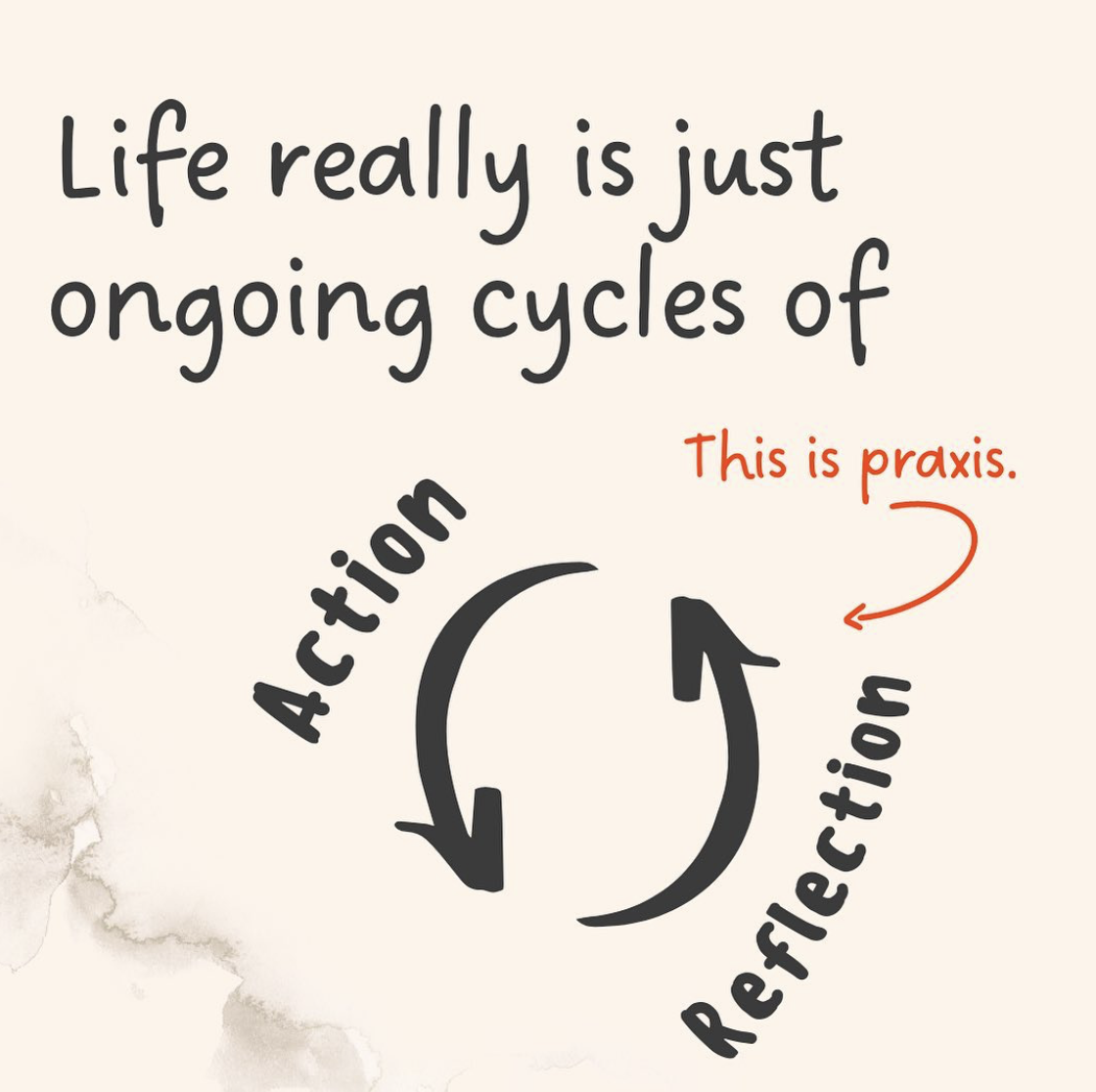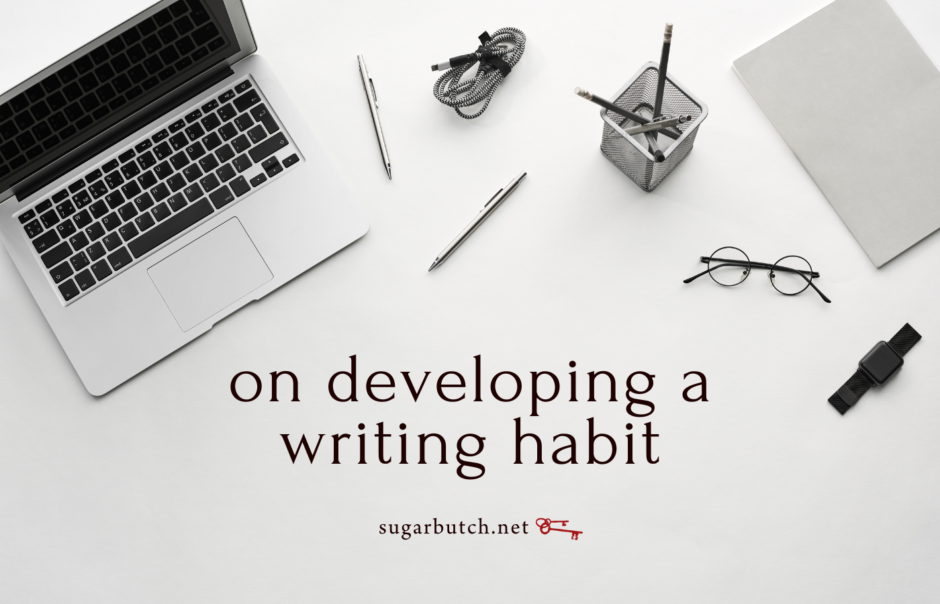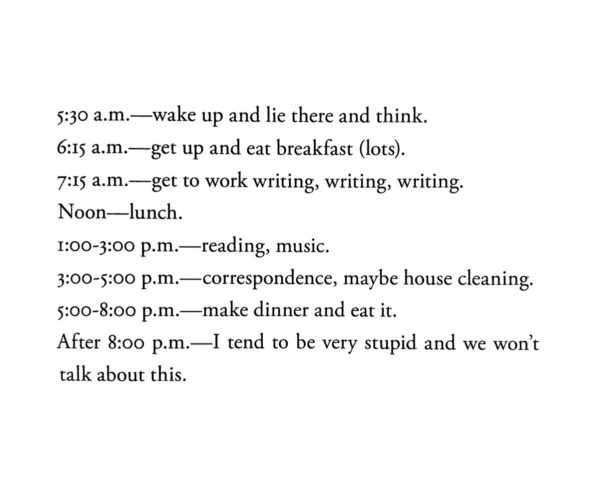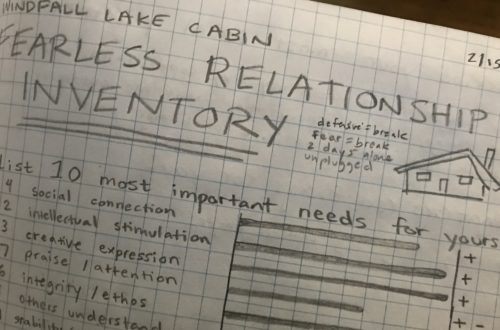This site contains explicit writings on kink practices, dominant/submissive relationships, and queer kink erotica (among other things). All characters in role play or non-consent scenes are consenting adults. Content warnings are included.
“Any tips for developing the time/habit/discipline to write regularly?”
This is an age-old question for not only writers, but everyone seeking a creative life. There are dozens of books about famous writer’s daily routines, and this is a frequent question asked of writers in interviews. And for good reason — modern daily life is absolutely not set up to prioritize creative play or the spaciousness needed to create. So how do we do it?
Maybe most importantly, how do you do it?
Here’s my best ideas and resources about this.
Protect Your Writing Time Fiercely
Add writing time to your schedule. Maybe it’s at the same time every day, maybe it’s once a week, maybe it changes each day or each week — doesn’t matter; figure out what works for you and your schedule.
But this part is important: Put barbed wire around the writing time on your schedule.
There will always be dishes to do, chores to finish, errands to run, people to tend to, things to shop for online. You will never be done with those things. Do not let those things infringe on your writing time, for even a minute.
Putting writing time on your calendar is a promise to yourself. How are you with promises to yourself? Do you break them? How much do you trust yourself to hold the promises you make to yourself? You might have to change your relationship with your own self-trust, depending on how it has been so far, in order to make and keep a regular writing time.
Do the Things that Surround Writing
Read. Read things you think you should know about, read things different than what you write, read books in your genre. Listening to audiobooks counts as reading.
Go out into the world (without your phone!) and observe. Spend time alone with your thoughts, where your brain has space to breathe and isn’t taking in more input.
When was the last time you were bored? When was the last time you felt like your mind actually emptied all the overloaded information it carries, and was able to think deeper?
It takes a lot of intention to have that kind of spaciousness. It is much easier to be in the information overload, and much harder to carefully, cautiously curate the information that goes into your mind (more on that later). It is worth it to make the effort of that intention so that you can more easily write and create.
I think of the writing process in three parts: 1. Enough time and space to think, form ideas, make connections, and be inspired. 2. The actual writing-words-down part. 3. Editing.
Then, of course, there’s the submitting, publishing, etc., but that is more of the admin and business of writing than the creative generation process. Those, to me, take different parts of my brain, and different kinds of effort.
Point is, the quiet before writing is an essential part of my own writing process, and it helped to learn that, and to keep barbed wire around that quiet part, too.
Your mileage may vary here, and you should investigate your own tendencies and how your writing process works (ideally and in practice). Maybe you need a significant amount of quiet time before you ever put your pen down. Maybe you need trigger moments, Pavlovian things that you do exclusively when you sit down to write, so that you can start building that trick to yourself that it’s time to focus — like the same playlist, or a candle you always light, or a particular scent you always add to your essential oil diffuser. Experiment! Take note of your successes. Try things, and adapt.
Look Into the Behavioral Science of Habits & Discipline
I’ve long been influenced by the website Tiny Habits, which was built by a behavioral scientist and explores how we change our behavior, which is what builds new habits.
He says: “only 3 things will change your behavior in the long term. Option A: Have an epiphany; Option B: Change your environment; Option C: Take baby steps.” Unfortunately, you can’t really force yourself to have an epiphany, but you can absolutely change your environment and take baby steps. He’s got a lot of great tips for how to do that, whether the habit you want to add is flossing, writing, or finishing a novel.
The book Atomic Habits by James Clear is very similar to me — “atomic” meaning “at the atom level,” he really focuses on the teeny tiny changes that can make a big difference over time. I really liked this powerful interview with him & Brene Brown on her Dare to Lead podcast, which has many of the core concepts in his book.
One key thing I’ve learned, and try to remember, is to always start small when building new habits. Make it ridiculously easy, way too easy, because then you will do it, and you will be more inspired to do more. It proves to yourself that you will do the things you say you’ll do, which is another important step. You start becoming the person who keeps promises to yourself, even the really small ones.
Surround Yourself with Inspiration
What kind of media are you consuming every day? Who do you follow on Instagram, Twitter, Facebook?
The information and media you consume is part of your “diet,” part of what you input into your body every day.
How deliberate are you about what you take in?
Start curating your feeds, algorithms, and media more deliberately to move you toward a writer’s life. Unfollow accounts that make you feel bad (this is good for everything, regardless of building a writing habit). Follow other writers, writing life accounts, writing quotes, inspiration, things in your genre. Watch documentaries about writer’s lives. Listen to podcasts that interview writers.
You can encourage yourself to hold to your goals, show up for your routines, and keep writing on your mind by changing the kind of media you’re consuming.
Accountability Buddies
In If the Buddha Got Stuck by Charlotte Kasl, she writes about trying to finish some very particular task, but that she just couldn’t do it. So, she says, “When you’re acting like a baby, get a babysitter.” She invited somebody over to help her with the task, and was able to get it completed.
Sometimes we need accountability. I’ve seen a lot about this under the idea of “body doubling,” not in a sci-fi kind of way, but in a “I need a body next to mine in order to focus” kind of way.
If this would be helpful, consider hosting or joining a co-working session or co-writing session. I’ve seen folks hosting this kind of thing in some of the Facebook groups about writing I’m in, and in various Discord channels. So you might have to go back a step and join and interact with some writing community in order to get access to these kinds of events.
If nobody you know is available for this, you can search “write with me” on Youtube and find folks who have recorded their co-writing times, and you can body double a recording. Is it the same? No. But it still might work!
Write Every Day, or Don’t
All the advice everywhere says “write every day.” Yeah, sure, in an ideal world, maybe someone would write every day — getting into a daily rhythm can be really helpful. But some people’s rhythms work in 2- or 3-day cycles, not just one 24 hour period.
The advice to write every day also presupposes a lot of things. You need an abundance of free time — and not everybody has that. Plenty of people have an exhausting full-time job (or two or three), children or aging family to take care of, or crises to manage regularly.
You also need relatively stable mental and physical health. If you have a mental health crash, a psychiatric episode, or if your physical wellness tanks, you will not be actually capable of showing up at your desk and doing your work. Maybe it’s possible 5 days our of 10, or even for months at a time, but there can and will be interruptions with our health and wellness that will change influence our routines. And for people with chronic physical or mental illnesses, or who live with people with chronic illnesses to whom we are a significant caregiver, a daily writing routine just isn’t realistic.
Parenting also influences the daily writing routine. The poet Lucille Clifton wrote dozens of books and produced some of my favorite poetry that I’ve ever read. She has an entire book of haiku, and I was taught (though I can’t find the source now) that she wrote haiku because she was parenting small children for a while, and just did not have more than a few minutes at a time for her writing. So, her writing got shorter.
My friend Minna Dubin created her public art project Mom Lists similarly, as she was writing herself into her new writing voice and explorations after having kids.
So maybe you write every day, maybe you don’t. Maybe your “routine” isn’t a consistent schedule, but carving out a few hours here or there when you can. That’s okay. Do what you can. Lean in to the habits and parts that work for you. Keep moving.
Time Goals vs Word Count Goals
Often, when you read about the routines of the great thinkers and writers and philosophers, they talk about using the container of time to get their work done. “I’m at my desk from 11am until 4pm,” or “I always write pre-sunrise from 4-8am.”
I find pomodoro-style “sprints” are also really useful. I set a timer for twenty minutes, focus on ONE THING and one thing only in that twenty minutes, and go for as long as I can. When the timer goes off, I take a short break, goof off, and do another 20 minute sprint. There are great apps and timers for things like this, like this Pomodoro timer. A timer can help me focus quite a lot.
Because look, let’s be honest. Twitter is right there. Email is right there. Netflix and Youtube and texting the love of my life are all on my computer, right next to my writing app.
Sometimes I have the will power and motivation to just not look at it, but sometimes I don’t.
I’ve had to be realistic about that as I get more serious about writing productively and paying attention to my routines and habits. So I often use focus apps, like Freedom, which I can set up for a certain amount of time and it will block everything except what I give it access to, or it will block specific things. Maybe it’d be better if I could just have the willpower myself, but sometimes that’s just not realistic. It has helped.
There’s a lot of new science available about how people just aren’t built to do more than 4 hours of deep work every day. As you’re setting up time goals for yourself, take a look at those studies and articles — and then, decide for yourself what works best for you, regardless of the studies.
So, making a writing goal of a specific time is one way to do it. But you can also set yourself word count goals.
There are some great sites and apps you can use to track your word count, like 750 Words, which takes Julia Cameron’s core concept of “morning pages” from The Artist’s Way and app-ifies it, aiming for three pages (250 words per page) each day.
Nanowrimo, the site that hosts National Novel Writing Month each November, has some great tools, and they’re actually available year round, so you can set up your own version of Nanowrimo and word count goals.
Don’t Forget About Your Body
It’s easy to get caught up in intellectual, emotional, brainy work of creating, thinking, and philosophizing — but don’t forget to tend to your body, in whatever ways work for you.
Keeping your body limber and strong will help you write longer, sit at your desk more comfortably, and to keep moving your own experience through your physical body.
But it’s not just tending to your body so you will have as much health as you can — it’s also the honoring of your body as a source of creativity, as fuel, and as an essential part of the creative process.
The science of creativity has been paying more attention to the role the body plays recently. In an article from Psychology Today, Jeffery Davis writes: “We know now, I hope, that being creative consistently—from ideation to block-busting to execution to launch & ship—involves much more than sitting and thinking. The body is not merely a shell. … “The artist takes the body with her,” Maurice Merleau-Ponty noted a few decades ago. The rest of the body—movement, gesture, musculature, autonomic functions—shapes how thought happens.”
If you want even more on this, the book Writing From the Body has great inspiration and activities to try to get further in touch with the wisdom of the body.
Look to Other Author’s Routines
It can help to read about other’s routines. Of course, the routines that are widely available are usually from the very famous, classic, white cis hetero writers of the 19th and 20th centuries, and these folks also usually had plenty of money and time to write.
Some had wives (or servants!) available to them — you’ve probably heard that thing about how Henry David Thoreau, famous for taking up a small home at Walden Pond and lamenting on nature, was regularly visited by his mother who did his laundry and brought him food. This is debatable, but continues to make the point: writers often had help to run the admin of their lives, and their daily writing routines may or may not be accessible to those of us who are now, in 2022, in late-stage capitalism, with inflation on the rise and wages remaining the same.
Nonetheless, I continue to be inspired by writer’s routines and reflections on how they create. Here’s some good ones.
- Podio Infographic about famous author’s routines.
- Another great infographic, also primarily focusing on early 20th century writers and white cis hetero men.
- James Clear compiled 12 daily routines from famous people, again mostly white cis hetero men. It includes “Commandments” from Henry Miller, which I adore, and which reminds me of Ben Franklin’s “Thirteen Necessary Virtues.”
- Daily Rituals: How Artists Work, by Mason Currey
- This image is from Ursula K. Le Guin’s routine, based on a 1988 interview with her, and indeed it really does sound like a pretty ideal day to me.
Most Importantly: Find What Works For You
That means experimenting with routines, goals, habits, techniques, tools, and everything you can think of — and then reflecting on what is working and what isn’t. Do more of what’s working; do less of what isn’t.

From Decenter the Teacher on Instagram
Eventually, you might write your own Commandments on how it works best for you.
Books & Resources
A Room of One’s Own by Virginia Woolf gives us this essential concept: “A woman must have money and a room of her own if she is to write fiction.”
The Creative Habit by Twyla Tharp — great summary here.
The Artist’s Way by Julia Cameron — if you’ve never worked through this 13-week program, it is absolutely worth doing at least once. There are virtual groups and (at least, in pre-pandemic times) in person groups forming frequently. The book has everything you need to create a group yourself — maybe a few friends would like to join you.
Daily Rituals: How Artists Work, by Mason Currey
Flow: The Psychology Of Optimal Experience by Mihaly Csikszentmihalyi
Atomic Habits: An Easy & Proven Way to Build Good Habits & Break Bad Ones by James Clear
Daily Routines archive on Marginalian (formerly Brain Pickings)
And even more book recommendations from Amazon, from my personal list of suggestions.
Please note: I’m linking extensively to Amazon here, primarily because they have an amazing database of book information. Amazon is a dangerous, has too much control over the publishing industry, and enables police surveillance, among many other things. I know Amazon makes things accessible to many people who might not have resources locally, who are disabled, or who are just unable to find alternatives. Totally get that, and no judgement — order from Amazon if you need to. (Read a How to Stop Shopping at Amazon article here.) If you can take the extra time to get these books from your local independent bookstores, or from places like bookshop.org, please do.





